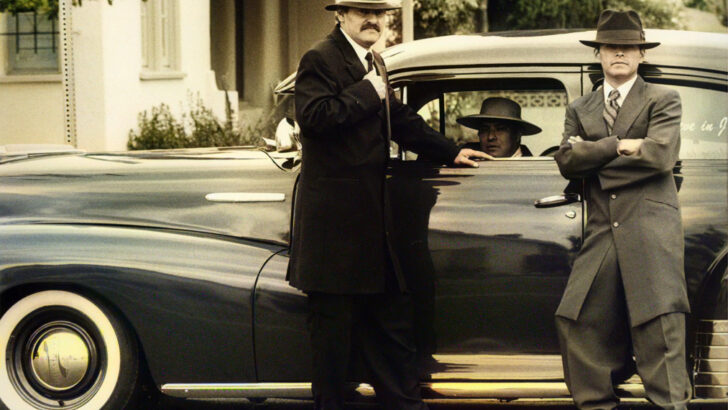Here’s a fascinating theme: “Family Values: the Catholic Church and the Mafia”. This was the subject of Fr Alexander Lucie-Smith’s address at last week’s Catholic Writers’ Guild in London.
Fr Alexander, born in Malta, is knowledgeable about Sicilian (and Calabrian society), and has written several novels intertwining the Mafia, the local priesthood, and the people.
The Mafia was originally a movement which helped landless peasants against wealthy landowners: ‘cosa nostra’. During the Second World War, the Mafia opposed Mussolini – “they hated anything that glorified the state” – and so, when the Americans liberated Sicily, ‘cosa nostra’ found themselves on the right side of post-war politics. The Americans empowered them for having been anti-Fascist, and this opened an influence with the United States.
Opposed
The Church, said Fr Lucie-Smith, was naturally opposed to the Mafia, since the mob were in the business of crime and murder. But the Church was also anti-Communist, and post-war, the Communist Party was strong in Sicily. There was something of a three-way power struggle, and the clergy often had to perform a balancing act.
Moreover, even though the Mafiosi themselves were gangsters (one cool-looking mafiosi, Salvatore Giuliano, is reckoned to have killed 250 policemen, the wives and mothers have usually been faithful Catholics. Sometimes a Mafiosi will say “I’m religious – my wife goes to Mass”.
An admirable priest who challenged the mob, Fr Pino Puglisi, was murdered and is regarded as a martyr”
Sicily is a close-knit society – ‘everyone is related’, and there’s always been a kind of solidarity against the Italian mainland, which some Sicilians call “the Continent”. Northern Italians also look down on southerners, which again solidifies community spirit.
In recent years, brave judges and courageous priests have defied the Mafia more robustly. An admirable priest who challenged the mob, Fr Pino Puglisi, was murdered and is regarded as a martyr.
But despite the best endeavours of reformers, the Mafia still exists: and is joined today by the Russian, Chinese, and Albanian mafias – the last said to be the most ruthless.
Paternalistic
Fr Alex, who is 61 and a parish priest near Epsom in Surrey, told a story which illustrated the “paternalistic” values of the Mafia. A young man informs his “godfather” that he has impregnated his girlfriend. “Marry her,” orders the Don. “Oh no – I’m not bothered about that,” says the fellow, being very modern. “In that case,” says the Mafiosi, “here’s some money – you can give it to your mother and she can spend it on your funeral.” The lad complied with “cosa nostra” orders!
Alexander Lucie-Smith’s novels follow themes of Italian priests and their moral struggles with Mafiosi and corruption: “The Chemist of Catania” and “The Nymph of Syracuse” are both gripping. They’re especially interesting for any cleric wrestling with issues of crime and criminals, and how to address community problems where gangsters are powerful.
A very strange cremation caper
November is the month when we especially remember the dead, and in that context, I must finally deal with the last of my late sister’s ashes. My sister Ursula died in New York in 2003, and what happened to her mortal remains was strange and indeed distressing.
She had arranged for a funeral home in upper Manhattan to carry out the cremation, after a Requiem Mass. I was in her apartment in East 19th Street when a box allegedly containing her ashes was delivered to me. I duly brought them back to Ireland; part of these ashes were scattered on Sandymount Strand, leaving some remaining in an urn.
It wasn’t long before I was contacted by the New York Police Department who informed me that the funeral home in question was a criminal operation which was trading in the body parts of dead people, for profit (run by an ex-dentist, who was charged and found guilty). The ashes returned to the families of the deceased were, in effect, fake. The body parts had been sold off all over Latin America, and, possibly, Asia.
So the ashes I hold are not, really, Ursula’s at all. Yet I’ve kept them all these years “in memoriam”. They have become more significant as symbolic remembrance than a burnt offering of the body.
*
Melania Trump is the most famous Slovenian in the world: and the second most globally renowned Slovenian is a Marxist (or Marx-ish) philosopher called Slovoj Žižek, aged 75. His is the name to drop in intellectual circles – he’s known as “The Elvis of Philosophy”.
I won’t pretend to understand, much less explain, his bewilderingly contradictory ideas (influenced by Hegal and Lacan, we’re told), but apparently his new book “Against Progress” argues that there is no such thing as linear progress (as Marx believed) – and we’re all doomed anyway.
However, on one literary point I’d confidently challenge him. He claims that Sam Beckett is a much more consequential writer than James Joyce. No way, José! Beckett is, mostly, a nihilistic bore – while JJ is forever rich in narrative, language and ideas.


 Mary Kenny
Mary Kenny
